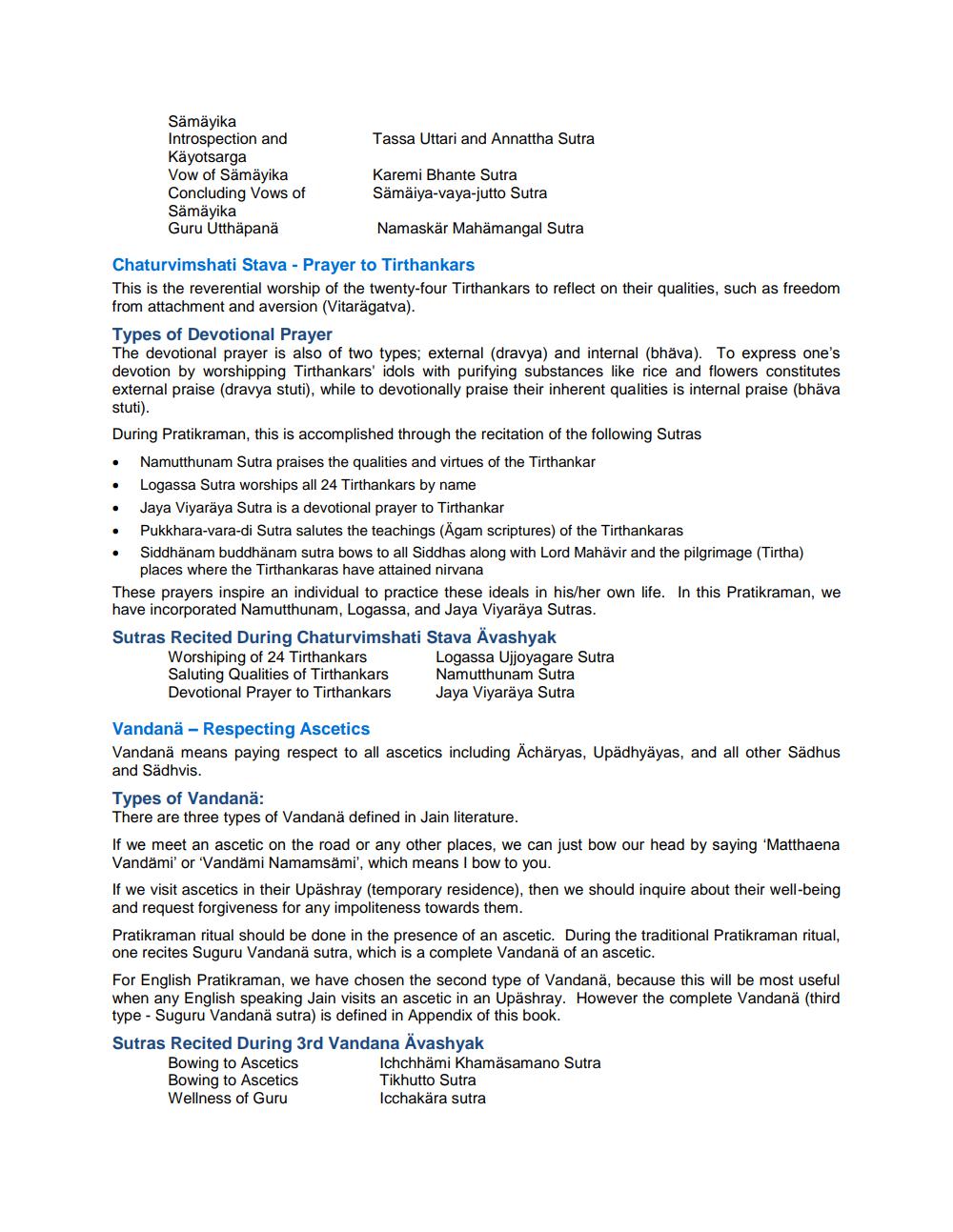________________
Tassa Uttari and Annattha Sutra
Sämäyika Introspection and Käyotsarga Vow of Sämäyika Concluding Vows of Sämäyika Guru Utthäpanä
Karemi Bhante Sutra Sämäiya-vaya-jutto Sutra
Namaskar Mahamangal Sutra
Chaturvimshati Stava - Prayer to Tirthankars This is the reverential worship of the twenty-four Tirthankars to reflect on their qualities, such as freedom from attachment and aversion (Vitaragatva). Types of Devotional Prayer The devotional prayer is also of two types; external (dravya) and internal (bhäva). To express one's devotion by worshipping Tirthankars' idols with purifying substances like rice and flowers constitutes external praise (dravya stuti), while to devotionally praise their inherent qualities is internal praise (bhäva stuti). During Pratikraman, this is accomplished through the recitation of the following Sutras
Namutthunam Sutra praises the qualities and virtues of the Tirthankar • Logassa Sutra worships all 24 Tirthankars by name • Jaya Viyaraya Sutra is a devotional prayer to Tirthankar
Pukkhara-vara-di Sutra salutes the teachings (Agam scriptures) of the Tirthankaras Siddhänam buddhänam sutra bows to all Siddhas along with Lord Mahävir and the pilgrimage (Tirtha)
places where the Tirthankaras have attained nirvana These prayers inspire an individual to practice these ideals in his/her own life. In this Pratikraman, we have incorporated Namutthunam, Logassa, and Jaya Viyaraya Sutras. Sutras Recited During Chaturvimshati Stava Avashyak Worshiping of 24 Tirthankars
Logassa Ujjoyagare Sutra Saluting Qualities of Tirthankars Namutthunam Sutra Devotional Prayer to Tirthankars Jaya Viyaraya Sutra
Vandana - Respecting Ascetics Vandanä means paying respect to all ascetics including Ächäryas, Upadhyayas, and all other Sädhus and Sädhvis. Types of Vandana: There are three types of Vandana defined in Jain literature. If we meet an ascetic on the road or any other places, we can just bow our head by saying 'Matthaena Vandämi' or 'Vandami Namamsämi', which means I bow to you. If we visit ascetics in their Upäshray (temporary residence), then we should inquire about their well-being and request forgiveness for any impoliteness towards them. Pratikraman ritual should be done in the presence of an ascetic. During the traditional Pratikraman ritual, one recites Suguru Vandana sutra, which is a complete Vandana of an ascetic. For English Pratikraman, we have chosen the second type of Vandana, because this will be most useful when any English speaking Jain visits an ascetic in an Upäshray. However the complete Vandana (third type - Suguru Vandana sutra) is defined in Appendix of this book. Sutras Recited During 3rd Vandana Avashyak Bowing to Ascetics
Ichchhami Khamasamano Sutra Bowing to Ascetics
Tikhutto Sutra Wellness of Guru
Icchakära sutra




